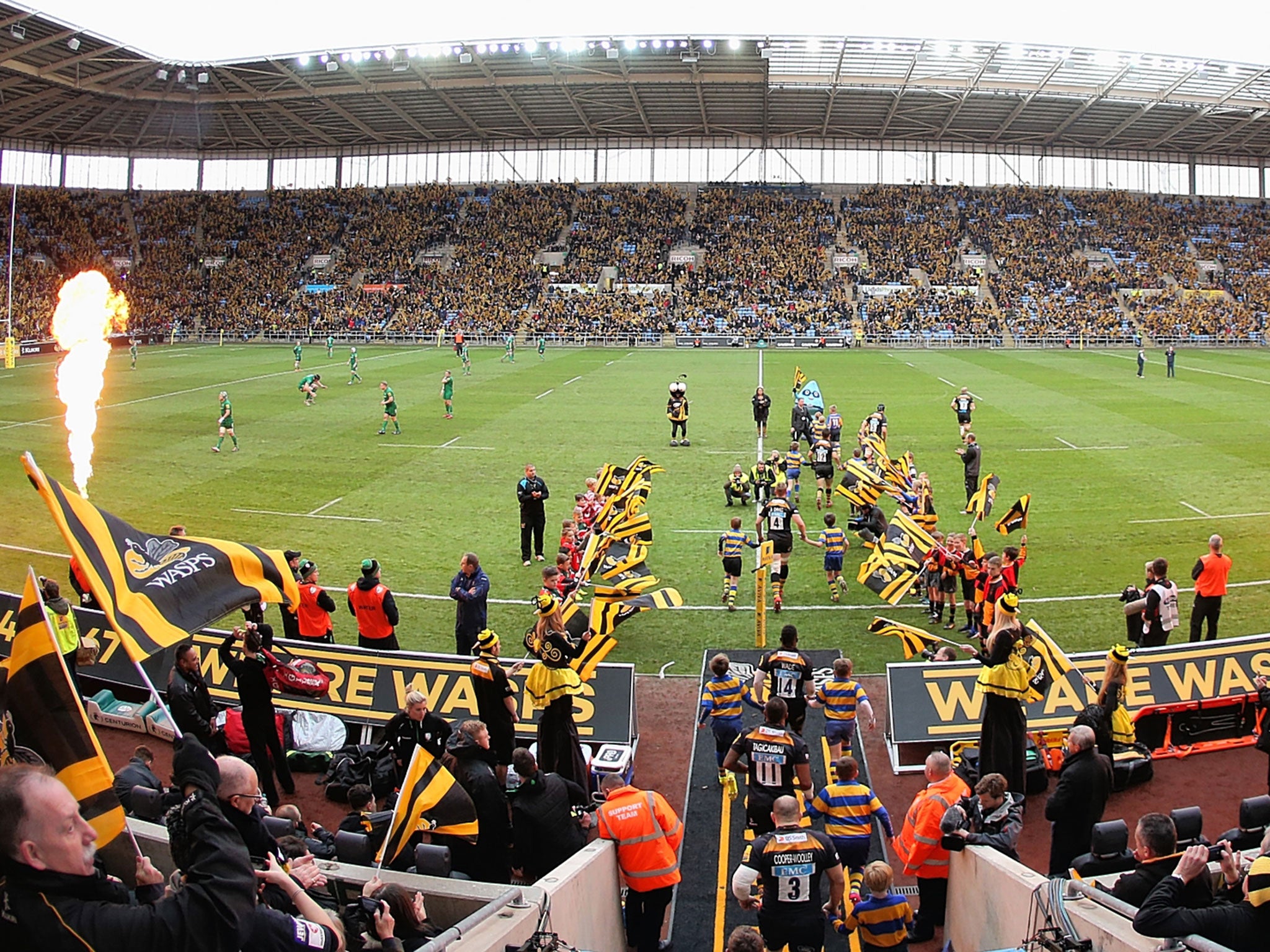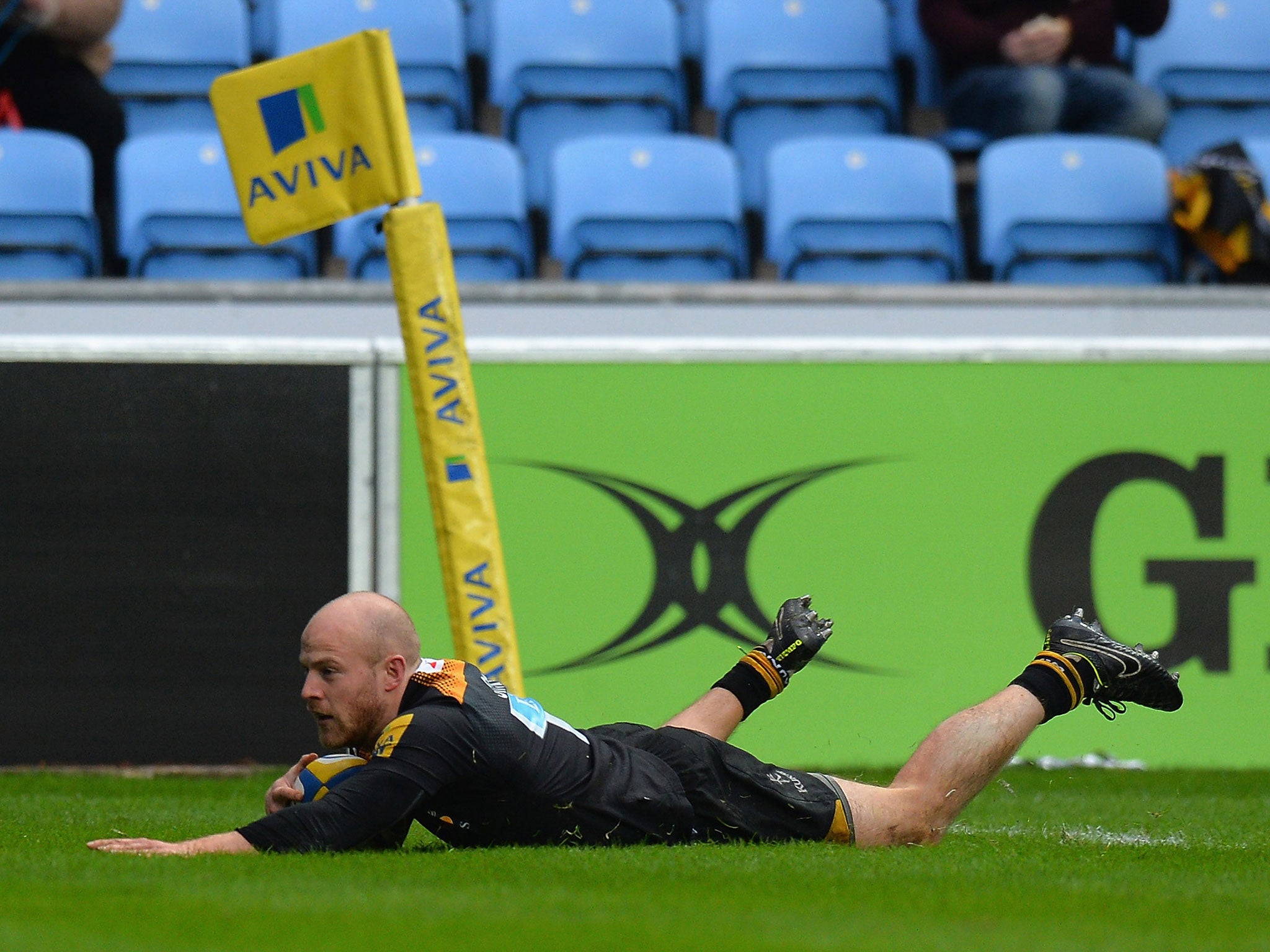Wasps reap reward from Ricoh gamble
Attendances and hopes are booming since Wasps were sent to Coventry, writes Chris Hewett. Now for a place in next season's Champions Cup

Your support helps us to tell the story
From reproductive rights to climate change to Big Tech, The Independent is on the ground when the story is developing. Whether it's investigating the financials of Elon Musk's pro-Trump PAC or producing our latest documentary, 'The A Word', which shines a light on the American women fighting for reproductive rights, we know how important it is to parse out the facts from the messaging.
At such a critical moment in US history, we need reporters on the ground. Your donation allows us to keep sending journalists to speak to both sides of the story.
The Independent is trusted by Americans across the entire political spectrum. And unlike many other quality news outlets, we choose not to lock Americans out of our reporting and analysis with paywalls. We believe quality journalism should be available to everyone, paid for by those who can afford it.
Your support makes all the difference.The journey from blue-collar rugby club to blue-chip rugby trailblazer sounds like a long and arduous one, but Wasps have shown just how short the time travel element can be. “We first came to look at this place just before Christmas in 2013 and moving here became a serious option in the middle of last year,” says Nick Eastwood, recently promoted from chief executive to deputy chairman, during a guided tour of the Ricoh Arena in Coventry. “It’s happened astonishingly quickly.”
As Eastwood knows better than anyone – he is, after all, the man with the figures on his laptop – the former European champions’ move from north London to the West Midlands is bearing fruit even more rapidly. If you want numbers, he can hit you with them straight between the eyes: attendances have tripled, hospitality business has risen by 500 per cent, retail revenue is up by a factor of 20. Close to bankruptcy more than once in recent years, Wasps suddenly have the biggest turnover of any Premiership club and believe they will knock Toulouse off the top spot in Europe in 2018, if not before.
It is hard to imagine a greater transformation. Wasps were the last English team to prevail in Europe – they beat Leicester in an all-Premiership final at Twickenham in 2007 – and on current projections they may also be the next one. David Young, their rugby director, is profoundly Micawberish in his reluctance to throw good money after bad, having spent the early part of his tenure wondering where the next penny was coming from, but he is now in a position to bid for the biggest names, which is no bad place to be in World Cup year.
As for those who believe English club rugby is about more than money – yes, there are still people who cling to such quaint views – they will be interested to learn that the move, deeply divisive in Wasps circles when first announced, appears to be working on many other levels. Two-thirds of the supporters who bought season tickets on the assumption that the club would continue to play at Adams Park in High Wycombe have renewed for next term. As for the players…
“I think the big question they asked themselves was whether they wanted to play their rugby at a Fourth Division football ground, or in a world-class arena,” Eastwood says, standing on one of the balconies overlooking a stadium that accommodates the best part of 33,000 spectators – one that will be damned near full when Leicester come to town for the penultimate round of Premiership matches in a fortnight’s time. “I think the move showed them exactly where we wanted to take the club – demonstrated the scale of our ambition. Was it a factor in Joe Launchbury [the much sought-after England lock] re-signing with us? I think it was.”
A walk through the Ricoh complex with Eastwood is only marginally less arduous than a hike with Sir Ranulph Fiennes. “When I show people round, there are moments when they start laughing at the sheer size of it,” he says during a perambulation around 6,000 square metres of exhibition space, a hotel that will soon come under the Hilton franchise and a casino that may not be big enough for Joe Pesci but certainly has the potential to earn its keep at the southern end of the M6. “Sometimes, I get lost myself.”
Which brings us to a serious question: namely, did Wasps lose their soul when they found the Ricoh? The move north, subject to confidentiality protocols until very late in the day, hit some of the club’s longest-standing followers for six, and several big-name players from the amateur era said they would rather cross the Thames to watch Harlequins than spend their weekends in “bloody Coventry”. It was difficult not to sympathise with some of the outpourings.

“It wasn’t an easy situation in those early days,” Eastwood acknowledges. “We knew there would be an emotional reaction, for perfectly understandable reasons, and all of us involved in this venture felt for those who raised objections. The first 48 hours, in particular, were very tough. Let’s face it: you don’t want to be standing in front of someone who is telling you, with tears in his eyes, that he won’t be able to travel as far as Coventry to watch his team play.
“But hell, it was necessary for us to do this. Why? Because the situation we were in was unsustainable. And after the initial expressions of shock, so many people understood that fact. They got it. When I’m carried out of here, I know I’ll be able to say that we did the right thing for the club.
“There were three principal factors that persuaded us that this was the way to go and they were of equal weight: the quality of the facility on offer; the deep-rooted rugby culture in the Coventry area, together with the latent support; and the enthusiasm of the city council, and others. To have brought this project to fruition in six months would have been remarkable in the private sector. To have done it in the public sector is something else again.
“Did we foresee such rapid success? Of course not. If we’d predicted it, we’d have been accused of being nuts. But looking at it from where we are now, I believe we can sustain it if we keep working as hard as we are. There was always going to be a novelty period, when people came along to see what was happening, but I think that has played itself out. There is a passion for rugby in this area and you can see that in the advance sales for the Leicester match. People here will come out in their thousands for a game of tiddlywinks if they think there’s a chance of beating Leicester at it.”
Eastwood is talking rugby modernism here: the commercial model he and his colleagues are putting in place will, in the fullness of time, be one-third rugby and two-thirds “other”. This, he believes, is the way forward – perhaps the only way for an English club to stack up against the powerhouse French teams, financed as many of them are by multinational businesses rooted in their localities. But none of this will go to plan if Wasps mess up on the field. What are the targets for Young and his squad between now and, say, the 2019 World Cup in Japan?
“I concluded a long time ago that target-setting creates more problems than it solves,” Eastwood replies. “Running a professional sports set-up in a brutally competitive environment like rugby is different to running a biotech company, where any number of firms can be flying simultaneously. If you take the view that winning the Premiership or the European Champions Cup is the only way of being successful, there is a heck of a lot of failure. And if you do set targets, you have to ask yourself what steps you’re prepared to take if they’re missed. Sack the whole coaching team? That would be pretty drastic.
“You have to understand where you are and where you’re trying to go, and you must take a realistic, coldly objective view of the size of the gap between those two points. If you reach a situation where a coach thinks the gap is much smaller than it actually is, there’s a problem building up. But to produce a document saying, ‘We need to win this trophy by this date’, is not my idea of a constructive way forward.”
For all that, Wasps have set themselves one immediate target: qualification for next season’s Champions Cup, as of right. Victory over Exeter tomorrow will put them within touching distance. The way things are going for them right now, anyone betting against them in the Ricoh casino might soon be parted from his chips.
Join our commenting forum
Join thought-provoking conversations, follow other Independent readers and see their replies
Comments